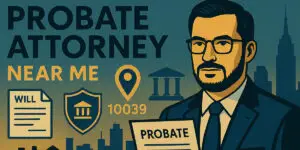Finding a lawyer around you for your estate is a hectic process when you have no idea where to start. Performing a search on different search engines online might be the idea that first strikes your mind. That is probably a good idea, but telling if an attorney is the best for you is the most difficult thing to do. Being carried away with fancy phrases such as “we will prevent you from probate progression,” is very easy, but you may get disappointed with how your estate planning will be executed with a bunch of jokers and scammers that flooded the online space. Specialization in estate planning determines the estate lawyer’s understanding of a particular need in estate planning. Every person has specific needs their estate plan has to cover. finding an estate lawyer whose skills and area of specialization matches your estate planning needs is crucial. Estate planning lawyers around your state in NY can be found easily when you use these tips:
1. Getting referrals from family and friends
Attainment of referrals from friends, family, or from people whom you trust is a considerable idea. In this case, the person giving referring you must have an already established plan to ascertain that they are giving you recommendations from experience. the similarity is also a key factor in your estate planning and the person’s estate planning. should be seen. This will guarantee the specialty of the estate planning lawyer towards your estate planning needs.
2. Recommendations from financial consultants and certified public accountants.
These people serve as an excellent source of giving you recommendations regarding the best estate lawyer near you in NYC. Working alongside different estate planning lawyers for a significant time is just a perfect scenario of knowing them. The chance of them recommending you to the best estate lawyer is very high, therefore, they should be a considerable source.
3. Consult Probate Courts NY
An experienced estate planning lawyer must have handled probate proceedings in court, and know the rules that govern estate planning. The courts will always have data of the estate lawyers who have handled the probate process. Accessing and checking the various attorneys’ details regarding their area of specialty and their ratings on this matter can just buy you a ticket to your estate lawyer.
4. Geography should not be a limit.
An estate lawyer in your state can be of great advantage, however, your local area should not be your limited area of search alone. Even though getting a local or smaller firm around your area is so advantageous, larger firms also have branches in various states around you in NY.
5. Schedule an interview with prospective lawyers
Having a list of questions for your potential lawyers, scheduling an interview with them is very crucial. This will allow you to interact with each one of them one by one for easy assessment.
FAQs:
1. Do I have to hire an estate lawyer?
Estate lawyers are very helpful in your process of estate planning. They assist you to draft the necessary estate deeds and ascertain the safety of your assets when you are alive and a successful transfer to your designated beneficiaries when you die.
2. Is probate desirable?
Probate is the process of administering an estate by transferring it to the heirs. Probate usually happens when your assets were of a great value that exceeds the probate set value, or when a person dies without a will.
3. What is the main objective of estate planning?
Estate planning aims at securing your financial and personal matters. This is by ensuring effective management of your assets during your lifetime and a safe transfer to your heirs when you die. Estate planning also covers personal affairs such as health care. A consultation with an estate lawyer gets you more informed.
4. How do I maximize estate planning?
Maximizing your estate plan simply includes strategies that you have to use to minimize your estate planning cost as possible and getting the most out of it. Some key strategies are; drafting a trust deed to avoid probate, participating in charitable offerings greatly reduces your estate taxes, life insurance policy helps you secure assets for your beneficiaries without passing through probate.
5. How different is a will from a trust?
A will is an estate deed that allows you to leave your beneficiaries with your assets while a trust is an estate planning tool used when a beneficiary is incapacitated and cannot manage the assets in their current state, this might be because they are minors or have dementia, etc. A trustee is appointed to hold the estate until the beneficiary becomes capable of managing them.









